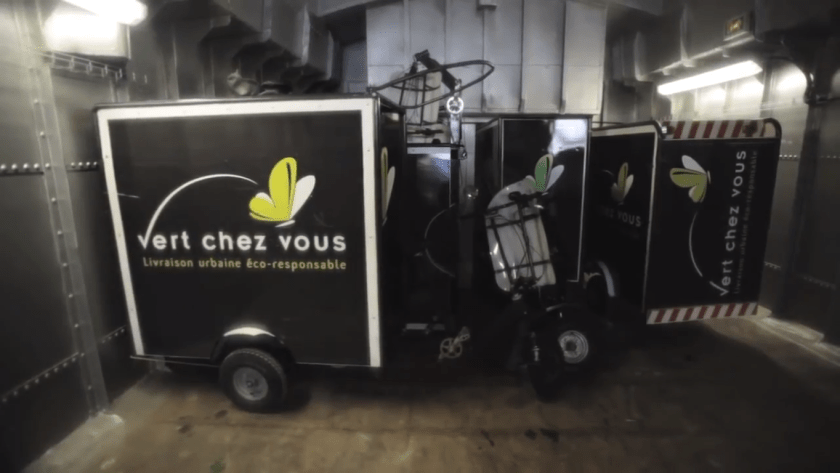Paris has suffered unprecedented levels of air pollution in recent years. In response, Mayor Anne Hidalgo has declared war on the car and aims to reduce their number by half. Swathes of the city will be pedestrianised. Regular, city-wide car free days are now held. Diesel vehicles will be banned from the city by 2020, much earlier than in comparable European capitals such as London.
It was against this backdrop that sustainable Paris-based logistics operator Vert Chez Vous began operating in 2012. The company used a multi-modal logistics chain delivering to the centre of Paris without using motorised vehicles. Instead, a barge delivered packages to moorings along the Seine, from where e-trikes carried out last-mile deliveries.
Packages and trikes alike were loaded and unloaded by crane using a suspended cage (see video below). At the start of the day the barge, named “Volkoli”, was loaded at a dock at the edge of the city centre, making several scheduled stops at points along the river. Each trike met the barge 3 or 4 times per day, not necessarily at the same point, to pick up or drop off packages. The system was reversed for collections. The trikes were also stored on board Volkoli.

You’ll notice this is written in past tense. This is because, unfortunately, Vert Chez Vous stopped using the boat in September 2014. The company is still a cycle-logistics operator in Paris, Toulouse and Aix-en-Provence; without boats. Jean François Mounic, CEO of parent company Labatut, cited economic reasons for the discontinuation of the boat-bike initiative – it was not profitable: “We are still looking for the business model. But I know that it exists and we are five years behind Germany.” Unfortunate, and as with any similar situation, the full picture explaining exact reasons behind the non-profitability is not immediately available.

That leaves us with speculation. It’s possible that for Paris, the boat-bike model was tested too early. Often, it is not enough to provide a carrot – a reward. In this case the carrot is a sustainable method of delivering goods around the city. Perhaps the initiative would have worked had the carrot been accompanied by a stick; a disincentive.
It’s possible that disincentivising use of the unsustainable alternatives being used instead of Vert Chez Vous; for the most part diesel-fuelled delivery vans, may have tipped the balance so that the boat-bike initiative became financially viable. The stick could be a financial disincentive such as a road congestion charge, or an outright ban on fossil-fuelled vehicles, or something else. Anyhow, a situation in which deliveries to the centre in diesel vans became undesirable would mean that alternatives would become more desirable. More demand would allow initiatives to upscale. Upscaling would allow operators to make significant savings using economies of scale. These savings could then in turn be passed onto customers, making the service competitive.

What is clear is that we will never really know what would have happened had things been different. However, it is still possible to learn from what happened. Governments and Municipalities have a big role to play, and whilst the carrots they offer often do have positive impacts, sticks are often also necessary to make the situation work. A balance must be struck.
Logistics often occupies a lower priority level in the minds of those in charge of urban planning policy than personal mobility, but in reality, the fate of both are tied up in the policies and infrastructure chosen by a city. Logistics is both affected by and profoundly affects the cityscape. The good news in the case of Paris, of course, is that disincentives are in the pipeline. It will be interesting to follow developments in the city as the 2020 diesel ban approaches and organisations in the city realise that change is coming.

We’ve covered boat-bike combinations before in RIPPL; click here to read about DHL’s multi-modal logistics chain in Amsterdam. Using often under-used waterways in dense, historic cities allows operators to reduce or even eliminate use of full size vehicles on congested urban road networks. In this way, the boat-bike combination can form the basis of smart, powerful solutions to perennial issues of congestion and pollution, allowing public space to be given over to projects that make cities more liveable.
Innovations: Boat-Bike, multi-modality
Organisation: Vert Chez Vous
Sector: Commerical
City: Paris
Country: France
Website: www.vertchezvous.com
Facebook: Vert Chez Vous Facebook
Twitter: Vert Chez Vous Twitter
Sources:
C. A. Brebbia: “Urban Transport XX” p287 (WIT Press 2014)
La Tribune: “En logistique urbaine la vertu est hors de prix” (November 2014)(French)
Logicities: “Trop d’initiatives de logistique urbaine s’arrêtent. Pourquoi?” (French)
The Guardian: “Paris mayor unveils plan to restrict traffic and pedestrianise city centre”
Sustainable Food In Urban Communities Blog: “Vert Chez Vous”
femininbio: “Faites livrer vos colis sans émission de Gaz à effet de serre” (May 2014)(French)
The Economist: “Driverless Paris? Bicycles and bans are reshaping the city”
Forbes: “Paris Can’t Breathe: Worst Pollution In A Decade Has City Gasping For Solutions”
Fluvialnet: “La péniche parisienne “Vokoli” débarque ses triporteurs pour livrer “propre”” (May 2012)(French)
Isabelle et le Velo: “Vert chez vous, le livreur qui s’adapte à votre ville” (November 2012)(French)

